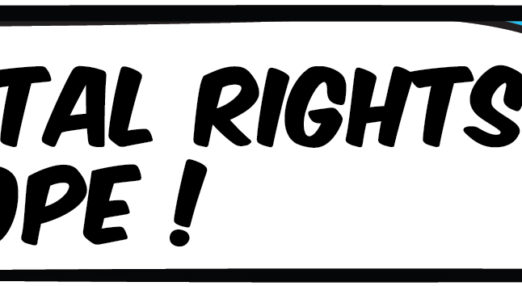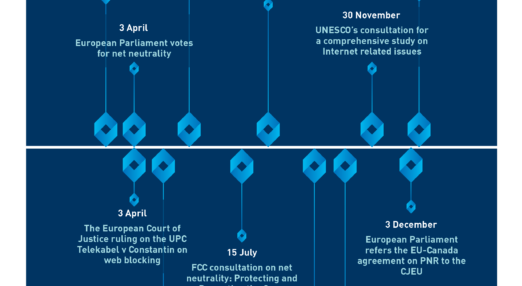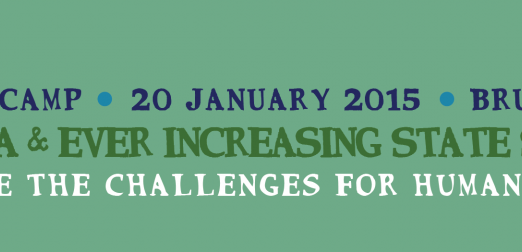surveillance
Filter by...
-

UK court finds secret spying docs made surveillance illegal
Several human rights groups are celebrating a major victory against the Five Eyes, an intelligence alliance comprising Australia, Canada, New Zealand, the UK and the US, as the UK surveillance tribunal ruled on 6 February that the Government Communications Headquarters (GCHQ) acted unlawfully in accessing millions of private communications collected by the National Security Agency […]
Read more
-

Digital Rights orgs call on world leaders to uphold human rights
Over 30 digital and civil liberties organisations from around the world have endorsed a joint statement calling on the world’s governments not to expand surveillance measures in the wake of the Charlie Hebdo attacks. In addition to European Digital Rights (EDRi), signatories include Article19, digitalcourage, IT-pol, Vrijschrift, La Quadrature du Net, Panoptykon, Initiative für Netzfreiheit, […]
Read more
-

Romanian cybersecurity law sent to the Constitutional Court
A new law on cybersecurity, previously reported in the EDRi-gram, was adopted by the Romanian Parliament at the end of 2014. The law gives the Romanian Intelligence Agency (SRI) access to any computer data owned by private companies, without a court order. The proposal was tacitly adopted by the Chamber of Deputies on 17 September. […]
Read more
-

EDRi’s work in 2014
EDRi continued to go to strength in 2014, with a hugely significant victory on net neutrality in the European Parliament and an innovative and successful campaign to raise the profile of our issues in the elections in May. Our successes last year built on a strong development of the organisation in recent years. Since 2009, […]
Read more
-

Privacy Camp: Big data and ever increasing state surveillance
As every year, EDRi is co-organising a privacy camp for civil society as a warm-up event for the CPDP conference. The event will discuss big data and every increasing state surveillance and the sessions will focus on privacy and data protection challenges and possibilities in Europe. It will take place on Tuesday, 20 January 2015 […]
Read more
-

EDRi Awards 2014
For the first time this year and with great solemnity, EDRi presents its first annual awards. 1. The “Humpty Dumpty Award” for the most silly “statistics”. Winner: Deutsche Telekom, for its “One Million Cyber Attacks per day”. This statistic was not plagiarised by any of DT’s employees. Honourable Mention: TERA for its “study” on losses […]
Read more
-

Irish surveillance legislation: secret interpretations of secret laws
A few weeks after introducing lawless internet blocking in Ireland, Minister for Justice Frances Fitzgerald took her assault on the rule of law to another level. On 26 November 2014, she introduced into national law – by means of a “Statutory Instrument” (SI, an executive power that does not require any parliamentary discussion) – new […]
Read more
-

Ground-breaking paper on internet rule of law launched by Council of Europe Human Rights Commissioner
Today, 8 December 2014, the Commissioner for Human Rights of the Council of Europe, Nils Muižnieks, released a so-called “Issue Paper” on The rule of law on the Internet and in the wider digital world, with important conclusions and recommendations. They cover four topics of particular interest to EDRi: privatised law enforcement, suspicionless mass data […]
Read more
-

UN calls for balance between privacy and security
In a special discussion at the Human Rights Council in Geneva, Flavia Pansieri, the United Nations (UN) Deputy High Commissioner for Human Rights, expressed her concern about increasing mass surveillance programs conducted by states and private corporations. Ms. Pansieri highlighted the importance of demonstrating that interferences with an individual’s right to privacy are both necessary […]
Read more
-

Poland: New project on public institutions’ surveillance practices
Every year more and more public money is invested in surveillance technologies – everything from drones and video surveillance to data mining software for public administration. Recently, the Polish government announced a new programme of co-financing surveillance cameras in the schools. Why do governments spends public funds on surveillance without justifying such investments or evaluating […]
Read more
-
Public Oversight and The Rule of Law
Between 15th-19th of September, in the week leading up the first year anniversary of the 13 Necessary and Proportionate Principles, EDRi, the EFF and the coalition behind the Principles will be conducting a Week of Action explaining some of the key guiding principles for surveillance law reform. Every day, we’ll take on a different part […]
Read more
-

The Principles Week of Action: A world without mass surveillance
Between 15 and 19 September, several digital rights organisations, including EDRi and many of its members, will be celebrating the first anniversary of the 13 International Principles on the Application of Human Rights to Communications Surveillance. The Principles were first launched in the Palais des Nations in Geneva on 20 September 2013. Drawing on international law […]
Read more
